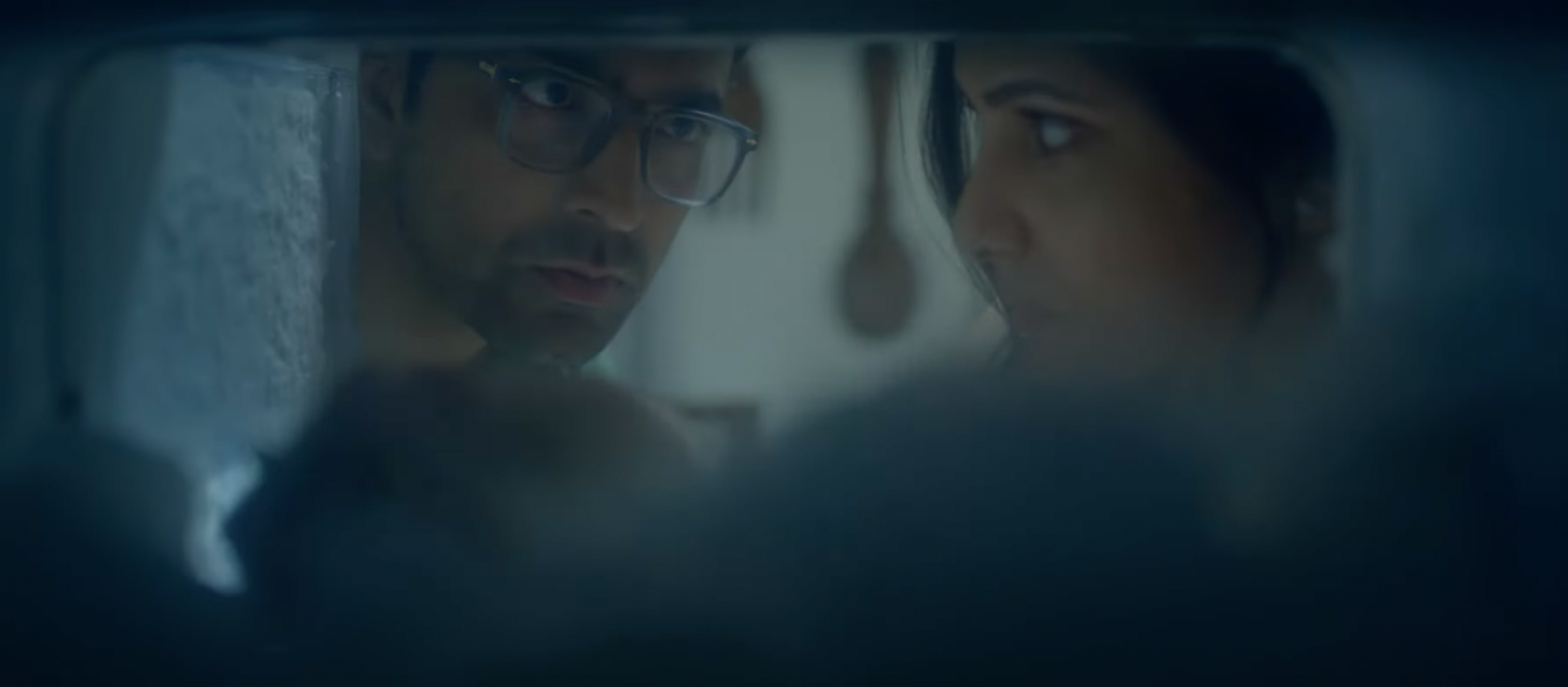Farhadi-esque, Hindi reworking of “Match Point,” domestic noir- you name it, and the adjectives are all there to describe and attribute “Gehraiyaan,” Shakun Batra’s stone-cold and well-executed drama about Indian millennials and the strands of unfaithfulness in their romantic relationships. While riddled with considerable issues in filmmaking and writing, it was a rather mature film that approached a subject as sensitive as infidelity on a cerebral level. Although less economically viable and with a less electrifying sexual charge, “Abyakto” fame director Arjun Dutta explores it with much more delicacy in the fabric of marital discord with his new film, “Deep Fridge.”
Marinated in a proper three-act structure that takes the story through its ‘melting point’ and the ‘defrost’ stage, the film explores the life of an elite couple stranded in what was their common household, once on a rainy night.
Swarnava, the kind of slight and sensitive quintessential Indian man who has his own slight indulgence of sitting in front of an open fridge late at night, is now married to Ronja, a student of his whom he was caught making out with on his third wedding anniversary.
Mili hasn’t settled into a married relationship yet, but has found love in Asif, a successful painter who does exhibitions overseas. While Swarnava has somewhat moved on from the sour moment that broke his love life years ago, Mili is persistent, finding it difficult to come to terms with the new dynamics of their relationship.
What follows inside the cinematic chamber, all this while, is quite predictable. The enclosed space and faint possibility of walking out for the moment compels the estranged man and woman to confront their past and navigate, along with the audience, the closure of their relationship. There are sleepless conversations, anxious phone calls, visits by concerned well-wishers, and, of course, the little kid who is the emotional centerpiece of an otherwise ‘adult,’ unsentimental tale of longing.
Imperatively, Dutta’s script, a seminal piece of accessible and simple writing, understands the beauty of understatement. It also gets that a story of romantic breakdown or simply the end of a love story must not restrict itself to its direct relatability. It speaks to all kinds of human relationships in general.
Some of us have a tendency to push the people closest to us to a point that they get hurt, and when they return with their new selves, or just simple normalcy, it is we who have to let go forcefully, and that hurts the most. The arrival of the film’s heroine, Mili, at that juncture towards the third act defines the film’s original and compelling stand taken on infidelity in a modern marriage, and how the couple’s search for some kind of idealism was vicious.

Supratim Bhol finds his own distinctive language to define the film’s visuals. His cinematography is tender and brutal in the same breath, and the whole film looks like someone whispered a few sparing colours in what was an otherwise monochromatic world, which only comes together colourfully for a single cup of tea towards the end.
The musical language is similarly disorienting because the songs are surprisingly comforting and have a memorably folkloric rhythm, which is oddly fitting to describe these urban characters who would die for a slice of creative postmodernism.
Swarnava and Mili, as characters, are surprisingly enhanced by the actors who perform them. Going a bit into the context of the industry itself, Abir Chatterjee and Tanusree Chakraborty have not been so promising in their individual careers. Don’t get me wrong, they are earnest actors who give their all to their characters, but more often than not, the quality of their films does a disservice to their sincerity.
However, Dutta’s characters are so specific, simple, and nuanced that they get coded into the mechanism of the leads. Abir has a sexual menace as the distressed and conflicted man who has at least a fraction of the clarity that is needed in the situation. But Tanusree is pitch-perfect as Mili, portraying herself as a mother for most of the film, and also her other side as a wife and a passionate lover gets revealed more intricately.
The only downside of the film is the way the other two man and woman have been written. Ronja and Asif come from challenging walks of life, especially subject to their relationships with Swarnava and Mili, respectively. However, the film considerably dilutes their presence to highlight the shattered marital bliss. Anyhow, Anuradha Mukherjee and Shoaib Kabeer are greatly effective in channeling these characters to a meaningful extent.
“Deep Fridge” is a grim, hopeful, and simultaneously arresting look at marital infidelity. With writing that is frequently interesting and takes a clear stand on what it believes, it comes out intelligent as well.





![Super Dark Times [2017]: Fantasia Film Festival Review](https://79468c92.delivery.rocketcdn.me/wp-content/uploads/2017/07/SuperDarkTimes_1-768x429.jpg)

![MICerz [2022] Review – An unfunny film about the struggles of stand up comedians](https://79468c92.delivery.rocketcdn.me/wp-content/uploads/2022/04/MICerz-Movie-Review-1-768x432.jpg)